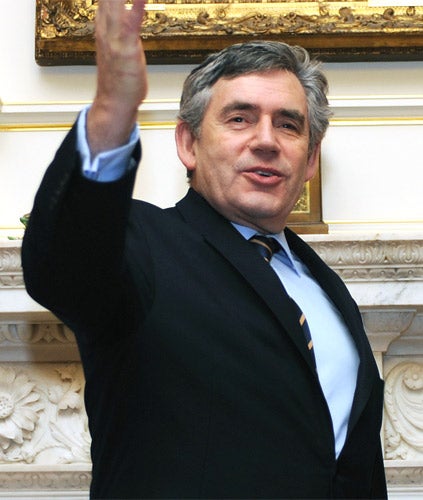Intelligence on WMD 'taken out of context', Iraq inquiry hears
Gordon Brown offers to give evidence to Chilcot before election

Your support helps us to tell the story
From reproductive rights to climate change to Big Tech, The Independent is on the ground when the story is developing. Whether it's investigating the financials of Elon Musk's pro-Trump PAC or producing our latest documentary, 'The A Word', which shines a light on the American women fighting for reproductive rights, we know how important it is to parse out the facts from the messaging.
At such a critical moment in US history, we need reporters on the ground. Your donation allows us to keep sending journalists to speak to both sides of the story.
The Independent is trusted by Americans across the entire political spectrum. And unlike many other quality news outlets, we choose not to lock Americans out of our reporting and analysis with paywalls. We believe quality journalism should be available to everyone, paid for by those who can afford it.
Your support makes all the difference.Intelligence outlining the threat posed by Saddam Hussein was taken out of context when it was used as part of the Government's case for invading Iraq, a senior member of Tony Blair's intelligence team has said.
Sir David Omand, who was Mr Blair's security co-ordinator, said that including the claim that Saddam had missiles that he could launch within 45 minutes in the now-infamous September 2002 dossier on Iraq was "asking for trouble". If all the intelligence on Iraq had been published, the public reaction would have been "Is that it?", he said.
In a wide-ranging condemnation of the document, given during his evidence to the Iraq inquiry, Sir David said that the manner in which intelligence was used to make "a case" for taking action against Iraq was a "big mistake". He revealed that the 45-minute claim was included to offer "local colour", adding that such a dossier should never be produced again.
Sir David said that Mr Blair should not have been allowed to state that it was "beyond doubt" that Saddam possessed weapons of mass destruction (WMD), a claim made in the former Prime Minister's foreword to the document. He said that the foreword was only shown to security officials "fairly late in the day" and should have been issued as a separate document. "My memory is that I didn't pay that much attention to this bit of it, which was a mistake," he said. "I totally failed to spot the potential problem that would arise."
He also admitted that the limitations of the intelligence on Iraq should have been spelt out more explicitly, while security forces "over-promised and under-delivered" on what they knew about Saddam. He blamed "group think" within the security forces for preventing them from questioning their assumption that Saddam was hiding WMD. Some people within the intelligence services still believed that evidence of WMD would emerge, he added.
Sir David also described how he marched into the office of Alastair Campbell and demanded to know "what on earth was going on" after the release of the so-called "dodgy" dossier, in February 2003. The document, which made further claims about Saddam's weaponry, was later found to have drawn on material from a journal article on the Middle East.
It emerged yesterday that Gordon Brown may now give evidence to the Iraq inquiry before the general election, after he revealed he had written to its chairman, Sir John Chilcot, telling him that he would be happy to appear "at any time".
Sir John, who confirmed he had received the letter, will now be under pressure to call Mr Brown. The inquiry has already heard that Mr Brown was in Mr Blair's "private circle of consultation" on Iraq. The former Defence Secretary, Geoff Hoon, also accused him of not providing the funds demanded by the armed forces for the operation and forcing the Ministry of Defence to cut helicopter orders.
"I have written to Sir John Chilcot and I have said to him that I am happy to give evidence at any time," Mr Brown said. "I am happy to give evidence about all the issues that he puts forward, and I am happy to satisfy the public of this country about our Government's commitment to the security of this country."
William Hague, the shadow Foreign Secretary, said voters had a right to hear from Mr Brown and urged Sir John to call the Prime Minister as soon as possible. "It is only right and proper that all those who played a role in taking the country to war give evidence, before the general election," he said.
Join our commenting forum
Join thought-provoking conversations, follow other Independent readers and see their replies
Comments